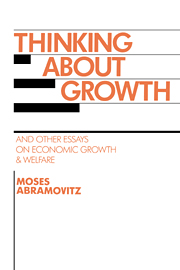9 - The passing of the Kuznets cycle
Published online by Cambridge University Press: 22 March 2010
Summary
In America, as Evelyn Waugh tells us, and particularly in California, where I now live, The Loved One who has “gone to his reward” is with lavish display, with appalling sentiment and with unbelievable expense tearfully interred and “laid to rest” by his “nearest and dearest”. And even in what you would regard as the civilized world, the man or woman who has “joined the majority” is decently buried by his relatives. But in the world of scholarship and science, things are different. Defunct hypotheses and theories are usually pushed into their graves by their enemies or, at best, by strangers, while their parents, guardians and friends rush about, kicking and screaming and insisting that the corpse is still very much alive, in fact never better – though perhaps he could use a few new kidneys, a heart or some other transplants. I suppose, therefore, that in coming before you today to argue that the Kuznets cycle (those 15 to 20-year growth fluctuations, roughly associated with long cycles in building), with whose care and feeding I have had something to do, has passed away, I shall be thought to be acting in bad taste by not conforming to the behaviour properly expected of me. But I offer the following defence.
First, I shall not be arguing that Kuznets cycles never existed – that this generalization about the form that growth used to assume in the United States and elsewhere was misconceived.
- Type
- Chapter
- Information
- Thinking about GrowthAnd Other Essays on Economic Growth and Welfare, pp. 276 - 298Publisher: Cambridge University PressPrint publication year: 1989

